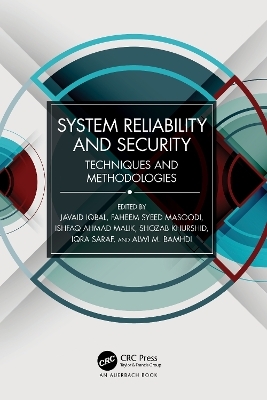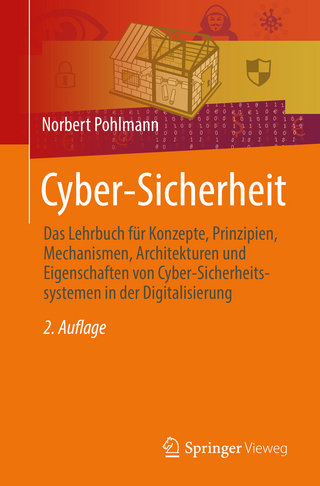
System Reliability and Security
Auerbach (Verlag)
978-1-032-38691-1 (ISBN)
Because of the growing reliance on software, concerns are growing as to how reliable a system is before it is commissioned for use, how high the level of reliability is in the system, and how many vulnerabilities exist in the system before its operationalization. Equally pressing issues include how to secure the system from internal and external security threats that may exist in the face of resident vulnerabilities. These two problems are considered increasingly important because they necessitate the development of tools and techniques capable of analyzing dependability and security aspects of a system. These concerns become more pronounced in the cases of safety-critical and mission-critical systems.
System Reliability and Security: Techniques and Methodologies focuses on the use of soft computing techniques and analytical techniques in the modeling and analysis of dependable and secure systems. It examines systems and applications having complex distributed or networked architectures in such fields as:
Nuclear energy
Ground transportation systems
Air traffic control
Healthcare and medicine
Communications
System reliability engineering is a multidisciplinary field that uses computational methods for estimating or predicting the reliability aspects of a system and analyzing failure data obtained from real-world projects. System security is a related field that ensures that even a reliable system is secure against accidental or deliberate intrusions and is free of vulnerabilities. This book covers tools and techniques, cutting-edge research topics, and methodologies in the areas of system reliability and security. It examines prediction models and methods as well as how to secure a system as it is being developed.
Javaid Iqbal is a Senior Assistant Professor in the Post Graduate Department of Computer Science, University of Kashmir, Srinagar Jammu and Kashmir, India. He did his PhD in Computer Science from the University of Kashmir in the year 2014. Faheem Syeed Masoodi is Assistant Professor in the Department of Computer Science, University of Kashmir. Earlier, he served College of Computer Science, University of Jizan, Saudi Arabia as an Assistant Professor. Ishfaq Ahmad Malik completed his Ph.D. degree in the year 2019 from Department of Mathematics, National Institute of Technology, Srinagar, Jammu and Kashmir, India. Shozab Khurshid completed her Ph.D. degree in the year 2019 from Post‐Graduate Department of Computer Science, University of Kashmir, India. Iqra Saraf completed her Ph.D. degree in the year 2019 from Post‐Graduate Department of Computer Science, University of Kashmir, India. Her research interests include software reliability, software optimization and software security. Alwi M Bamhdi is an associate professor in the Department of Computer Sciences, Umm Al-Qura University, Saudi Arabia. He received his MSc and Ph.D. in computer science in 2014 from Heriot-Watt University, UK.
1. A GNN Approach for Software Reliability, 2. Software Reliability Prediction Using Neural Networks: A Non-parametric Approach, 3. Analysis and Modelling of Software Reliability Using Deep Learning Methods, 4. Fixed-Design Local Polynomial Approach for Estimation and Hypothesis Testing of Reliability Measures, 5. Reliability Analysis of Relation between Urbanization, Vegetation Health, and Heat Island Through Markov Chain Model, 6. Modeling and IoT (Internet of Things) Analysis for Smart Precision Agriculture, 7. Engineering Challenges in the Development of Artificial Intelligence and Machine Learning Software Systems, 8. Study and Analysis of Testing Effort Functions for Software Reliability Modeling, 9. Summary of NHPP-Based Software Reliability Modeling With Lindley-Type Distributions, 10. Artificial Intelligence and Machine Learning Problems and Challenges in Software Testing, 11. Software Quality Prediction by CatBoost: Feed-Forward Neural Network in Software Engineering, 12. Software Security, 13. Definitive Guide to Software Security Metrics, 14. Real-Time Supervisory Control and Data Acquisition (SCADA) Model for Resourceful Distribution and Use of Public Water
| Erscheinungsdatum | 12.12.2023 |
|---|---|
| Zusatzinfo | 26 Tables, black and white; 81 Line drawings, black and white; 81 Illustrations, black and white |
| Verlagsort | London |
| Sprache | englisch |
| Maße | 156 x 234 mm |
| Gewicht | 880 g |
| Themenwelt | Informatik ► Netzwerke ► Sicherheit / Firewall |
| Mathematik / Informatik ► Informatik ► Theorie / Studium | |
| Informatik ► Weitere Themen ► Hardware | |
| Recht / Steuern ► Privatrecht / Bürgerliches Recht ► IT-Recht | |
| Technik ► Umwelttechnik / Biotechnologie | |
| ISBN-10 | 1-032-38691-6 / 1032386916 |
| ISBN-13 | 978-1-032-38691-1 / 9781032386911 |
| Zustand | Neuware |
| Informationen gemäß Produktsicherheitsverordnung (GPSR) | |
| Haben Sie eine Frage zum Produkt? |
aus dem Bereich


